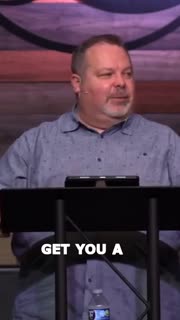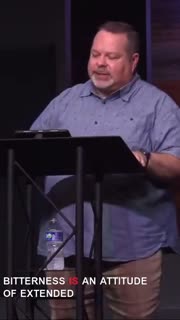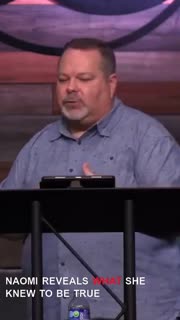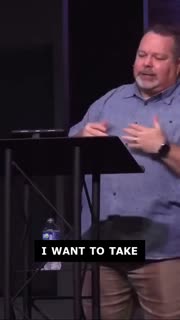Overcoming Bitterness: Finding Freedom in God's Sufficiency
Devotional
Sermon Summary
Bible Study Guide
Sermon Clips
### Quotes for Outreach
1. "If you don't get you a bracelet, that's fine, but get that in your spirit. What does it matter? Because if it doesn't matter, don't let it worry a wart on your brain. Go ahead and move forward in Jesus. Amen? Amen." [28:05] (11 seconds)
2. "Bitterness is an attitude of extended and intense anger and hostility. It is often accompanied by resentment, and a desire to get even. It is a result of not forgiving an offender, and letting the hurt and anger grow until the pain and resentment sour the person's view of life." [33:46] (15 seconds)
3. "I just want to encourage you today that he loves them more than you do. And he desires relationship with them more than he can desire anything else. And so he did. He loved them so much. Just like he died for you, he died for them." [01:09:34] (17 seconds)
4. "I just want you to know that you're not alone. If you've got a child that has you broken up inside, if you've got a child you're struggling to trust God in the midst of and not intervene, and not take over, and not come in and knock heads and, you know, all the things that we as dads and moms love to do." [01:09:34] (16 seconds)
5. "I want to remind you that you never ever get to the right place if you're walking in the wrong direction. If you're walking away from God today, I would encourage you very simply to turn back to God today. You can't make up the distance in one step but all it takes is one step and God will come running to you." [01:01:57] (19 seconds)
### Quotes for Members
1. "A distorted view of God always leads to a distorted view of life. Anytime we don't see God as he is, we start to wrongly interpret what is going on around us." [46:00] (12 seconds)
2. "What you call God reflects how well you know him. What you call him reflects how well you know him. I want you to think about this a minute. The way you view God, how you address him, what you call him reflects on how well you know him." [52:16] (16 seconds)
3. "Naomi reveals what she knew to be true about God when she was a child. And she declares that the Almighty has made my life very bitter. The Hebrew name for God that's translated as Almighty is El Shaddai. Some of you grew up listening to Amy Grant sing El Shaddai and you had no idea what that meant." [54:14] (16 seconds)
4. "I want to talk to somebody today who's confused because maybe you're still battling an addiction or fighting against depression and you've done what the preacher said and you've tried to do all the things. You prayed the prayers. You surrendered to God and yet you're still struggling." [01:01:18] (15 seconds)
5. "I want to take a moment and think about it. Is the trajectory of your life pointed toward the things of God or toward the things of this world? Does your mind drift toward things that are good and God honoring? Paul says whatsoever things are true, honorable, right, pure, lovely, admirable. Those are the things I should be thinking about." [44:17] (19 seconds)
Ask a question about this sermon
1. "If you don't get you a bracelet, that's fine, but get that in your spirit. What does it matter? Because if it doesn't matter, don't let it worry a wart on your brain. Go ahead and move forward in Jesus. Amen? Amen." [28:05] (11 seconds)
2. "Bitterness is an attitude of extended and intense anger and hostility. It is often accompanied by resentment, and a desire to get even. It is a result of not forgiving an offender, and letting the hurt and anger grow until the pain and resentment sour the person's view of life." [33:46] (15 seconds)
3. "I just want to encourage you today that he loves them more than you do. And he desires relationship with them more than he can desire anything else. And so he did. He loved them so much. Just like he died for you, he died for them." [01:09:34] (17 seconds)
4. "I just want you to know that you're not alone. If you've got a child that has you broken up inside, if you've got a child you're struggling to trust God in the midst of and not intervene, and not take over, and not come in and knock heads and, you know, all the things that we as dads and moms love to do." [01:09:34] (16 seconds)
5. "I want to remind you that you never ever get to the right place if you're walking in the wrong direction. If you're walking away from God today, I would encourage you very simply to turn back to God today. You can't make up the distance in one step but all it takes is one step and God will come running to you." [01:01:57] (19 seconds)
### Quotes for Members
1. "A distorted view of God always leads to a distorted view of life. Anytime we don't see God as he is, we start to wrongly interpret what is going on around us." [46:00] (12 seconds)
2. "What you call God reflects how well you know him. What you call him reflects how well you know him. I want you to think about this a minute. The way you view God, how you address him, what you call him reflects on how well you know him." [52:16] (16 seconds)
3. "Naomi reveals what she knew to be true about God when she was a child. And she declares that the Almighty has made my life very bitter. The Hebrew name for God that's translated as Almighty is El Shaddai. Some of you grew up listening to Amy Grant sing El Shaddai and you had no idea what that meant." [54:14] (16 seconds)
4. "I want to talk to somebody today who's confused because maybe you're still battling an addiction or fighting against depression and you've done what the preacher said and you've tried to do all the things. You prayed the prayers. You surrendered to God and yet you're still struggling." [01:01:18] (15 seconds)
5. "I want to take a moment and think about it. Is the trajectory of your life pointed toward the things of God or toward the things of this world? Does your mind drift toward things that are good and God honoring? Paul says whatsoever things are true, honorable, right, pure, lovely, admirable. Those are the things I should be thinking about." [44:17] (19 seconds)










